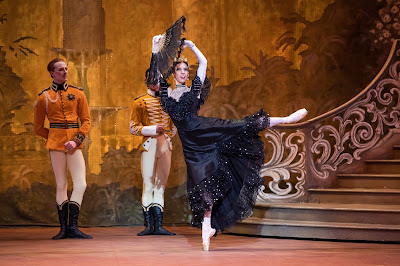Still Point Turning - The Catherine McGregor Story.
Staged and
directed by Priscilla Jackman from verbatim interviews with Catherine McGregor. Designed
by Michael Scott-Mitchell. Lighting by Nick Schlieper. Composer and Sound
Designer. Steve Francis. Wharf 1. Sydney Theatre Company. April 21 to May 26
2018
Reviewed by Peter Wilkins.
 |
| Heather MItchell as Catherine McGregor |
An Extraordinary Life. That could
as well have been the title of Priscilla
Jackman’s dramatic staging of Catherine McGregor’s remarkable life. Soldier,
cricket commentator, columnist, advocate, recipient of the Order of Australia,
Queensland Australian of the Year, nominee for Australian of the Year and Trans
woman, McGregor ‘s remarkable life and achievements are chronicled in the
Sydney Theatre Company’s production of Still Point Turning.
Director, Priscilla
Jackman has drawn on countless hours of interviews and correspondence with Catherine
McGregor to dramatically portray McGregor's journey from her biological birth
as Malcolm McGregor to her eventual transition
to the female gender, a need that McGregor recognized as early as eight years
of age, but which did not reach a crisis point until she was diagnosed as trans
by Cornelius Greenaway, while working in the Head Office of the N.S.W. Labour
Party.
There is nothing dry however about
Jackman’s sensitive, poignant and powerfully moving dramatization of McGregor’s
life. In less than two hours, she is able to encapsulate the drama, conflict
and profound humanity that is at the very heart of a remarkable human being’s
life. It could be so easy to sentimentalize, glamourize or embellish a life
lived in so many chapters of the human condition. And yet this is so very
carefully avoided. McGregor has been totally honest in her revelations. Her
struggle with her gender identity, her testosterone charged heterosexuality as
a military officer, serving in East Timor as a commanding officer, her marriage, and her psychological and physical decline
into alcoholism. The dreaded spectre of gender dysphoria is ever present, and
with it the pervasive fear of death as she asks the nurse in the opening scene,
“Will I wake up”?
 |
| Ashley Lyons as Malcolm McGregor |
Jackman’s direction appropriately
observes the significance of her task to bring McGregor’s life story to the
stage. Her approach is simple, economical and strikingly effective in its clear
focus. She is assisted by Michael Scott Mitchell’s functional and effective
design. Much of the action takes place on an open stage. A translucent curtain
is used to bring on a hospital bed and a unicorn in a Les Girls sequence. A
chair will appear but much of the movement is played out on the floor as actors
appear. Drama workshop techniques serve to express McGregor’s experience
through trust work and physical theatre
action. It all serves the directness of the story and the emotional impact of
each circumstance. Malcolm’s descent
into decadence and debilitating alcoholism isvivifdly captured in the one
opulent scene at Les Girls.
 |
| Andrew Guy as Young Malcolm. Georgina Symes as Ayla Holdom |
Jackman’s casting is excellent.
Although the play revolves around Heather Mitchell’s performance as Catherine
McGregor, she is supported by an outstanding ensemble who briefly capture the
characters who pass through McGregor’s life and McGregor during her life as a
male. Nicholas Brown imbues Indian cricketing legend, Rahul Dravid with a
wisdom and calming spirituality that helps McGregor through her torment. Andrew
Guy captures the insecurity of young Malcolm, intimidated by an overbearing
father. Chantelle Jamieson gives a very heart-warming performance as a Qantas
official, who demonstrates compassion and understanding when McGregor is preparing to present herself
as a woman with her male ID. As Ayla Holdom, the transgender British helicopter
pilot and very close friend, Georgina Symes is the gentle voice of
companionship, shared experience and affectionate compassion. As Malcolm
McGregor, Ashley Lyons tears apart preconception and assumed stereotype. He is
all male, conditioned by a belittling father who died when he was eight,
conditioned by his stern military training and battling the trauma of
expectation and inner conflict.
As Catherine McGregor, Mitchell gives
an utterly galvanizing performance. She reaches far beneath the physical persona
to plummet the depths of psyche and desire. Forthright and honest, a trans
woman who has arrived at the point of knowing thyself, cracking any trace of self
pity or indulgence with a strident, impulsive laugh and a liberal layering of
the F word, she makes us fascinated spectators. At times she addresses people
in the front row, releasing tension but forever aware of the importance of her
story and the person she plays upon the intimate Wharf Theatre stage.Though not
perhaps as tall as Catherine McGregor, Mitchell gives a towering performance and is every bit the embodiment of the
woman seen on television or read in print or spoken about in the programme.
Still Point Turning is more than a play about Catherine McGregor. It
is a lesson in humanity, a cry for compassion, a plea for understanding and a
salute to difference. It is an assault on prejudice and a jolt to complacency.
As Rahul was an inspiration to McGregor, McGregor is an inspiration to all
those who struggle with identity, who are cast cruelly into the shadows of
society and who deserve the right to stand in the light and be recognized for
whom they are.
My hope is that Still Point Turning will come to
Canberra next year, and from there to other parts of the nation. It is a play
that must be seen by all. Funny and sad, powerful and profound,it shines a
light through the darkness and we are the better for it.





















